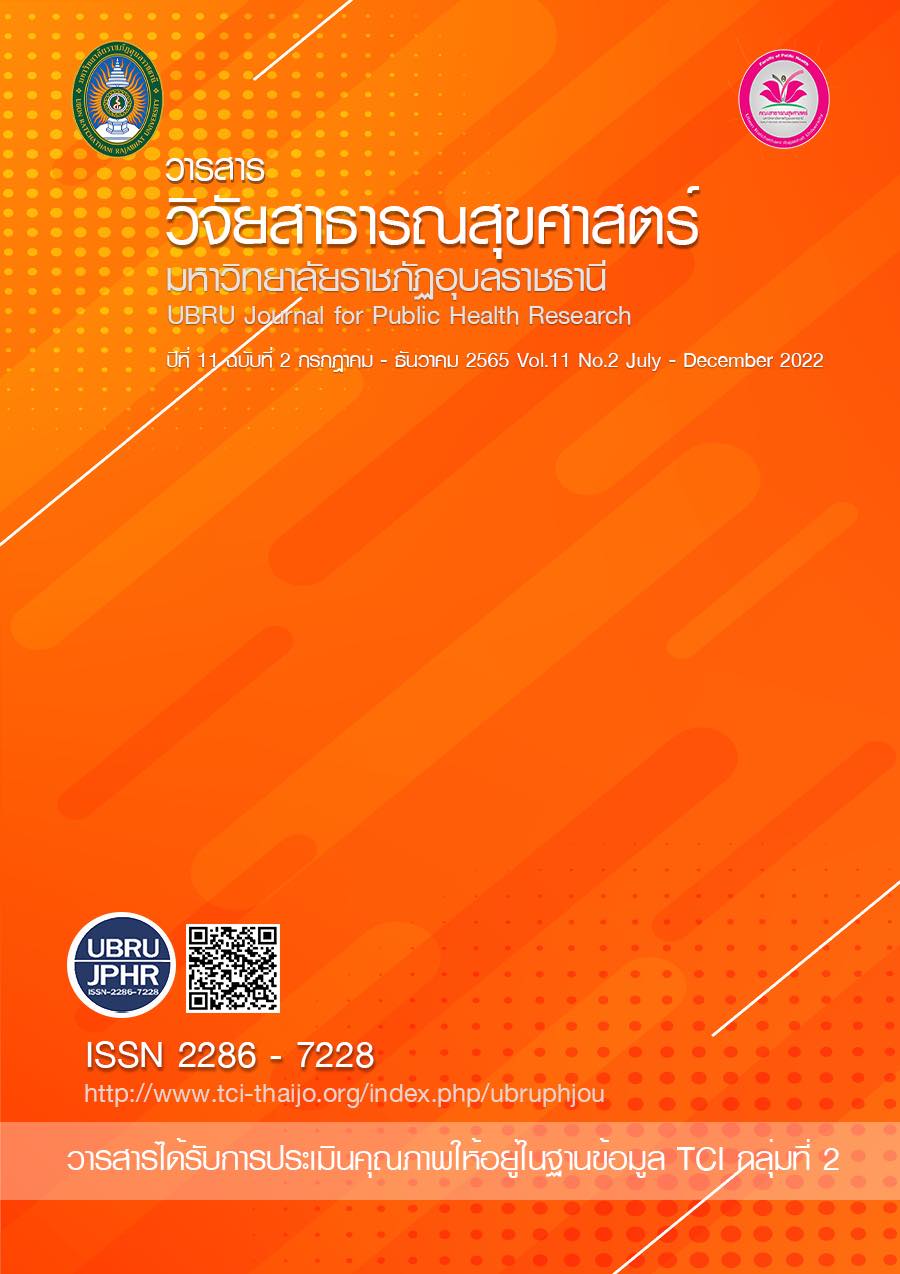การพัฒนาตนเองเพื่อเพิ่มศักยภาพในการปฏิบัติงานของบุคลากรสาธารณสุขในสำนักงานสาธารณสุขแขวงจำปาสัก สาธารณรัฐประชาธิปไตยประชาชนลาว
คำสำคัญ:
การพัฒนาตนเอง, ทักษะการปฏิบัติงาน, ศักยภาพของบุคลากรสาธารณสุขบทคัดย่อ
การวิจัยครั้งนี้มีวัตถุประสงค์เพื่อให้บุคลากรสาธารณสุขสามารถพัฒนาตนเองเพื่อเพิ่มศักยภาพในการปฏิบัติงานของตนเองในสำนักงานสาธารณสุขแขวงจำปาสัก สาธารณรัฐประชาธิปไตยประชาชนลาว การวิจัยนี้เป็นการวิจัยเชิงปฏิบัติการ แบ่งการศึกษาออกเป็น 3 ระยะ ได้แก่ ระยะที่ 1 ระยะเตรียมการ โดยมีการศึกษาบริบทของสภาพปัญหาที่เกี่ยวข้องกับทักษะความสามารถ และเทคนิควิธีการปฏิบัติงานในแผนกงานตนเองของบุคลากรทางด้านสาธารณสุข ระยะที่ 2 ระยะดำเนินการ โดยดำเนินการตามกระบวนการ PDCA และระยะที่ 3 ระยะประเมินผลการศึกษาการการพัฒนาตนเองเพื่อเพิ่มศักยภาพในการปฏิบัติงานของบุคลากรสาธารณสุข ได้แก่ การค้นหาปัญหาจากการศึกษาบริบทของสภาพปัญหาในระยะที่ 1 การประเมินความรู้ ความเข้าใจที่เกี่ยวกับงานในแผนกของตนเองของบุคลากรสาธารณสุข การประเมินทัศนคติที่เกี่ยวข้องกับภาระงานและการปฏิบัติงานจริง และการประเมินทักษะ ความสามารถ และเทคนิควิธีความชำนาญที่เกี่ยวข้องกับงานในแผนกของตนเอง โดยศึกษาในกลุ่มบุคลากรสาธารณสุข 6 แผนกงานที่เกี่ยวข้องกับงานบริการทางด้านสุขภาพ ได้แก่ แผนกจัดตั้งพนักงานและการศึกษาสาธารณสุข แผนกรักษาฟื้นฟูหน้าที่การงาน แผนกอนามัยและส่งเสริมสุขภาพ แผนกควบคุมโรคติดต่อ แผนกอาหารและยา และแผนกประกันสุขภาพ โดยกลุ่มตัวอย่างประกอบด้วย 2 ส่วน คือ 1. กลุ่มตัวอย่างที่ให้ข้อมูลเชิงคุณภาพ 15 คน ประกอบไปด้วย ผู้บริหารระดับสูงของสำนักงานสาธารณสุขจำปาสัก 5 คน หัวหน้าและตัวแทนของแผนกงาน รวม 10 คน 2. กลุ่มที่ให้ข้อมูลเชิงปริมาณ ในส่วนของการมีกิจกรรมการอบรมความรู้ ความเข้าใจ รวมไปถึงทักษะที่เกี่ยวข้องกับแผนกงาน จำนวน 43 คน ซึ่งวิเคราะห์ข้อมูลโดยการแจกแจงความถี่
ร้อยละ ค่าเฉลี่ย ส่วนเบี่ยงเบนมาตรฐาน และประเมินผลด้วยสถิติ Paired t-test ที่ระดับ P-value <0.05
ผลการศึกษา พบว่า ในระยะที่ 1 บุคลากรสาธารณสุขในสำนักงานสาธารณสุขแขวงจำปาสักยังขาดทักษะความเชี่ยวชาญที่สูงขึ้นและจำเป็นในการให้บริการทางด้านสุขภาพ และยังมีความต้องการในการอยากพัฒนาตนเองทั้งด้านการเข้ารับการฝึกอบรม และการศึกษาต่อในระดับที่สูงขึ้น ในระยะที่ 2 เนื่องจากสาธารณรัฐประชาธิปไตยประชาชนลาว ยังขาดทรัพยากรบุคคลทางด้านสาธารณสุข แม้ภาครัฐจะมีนโยบายให้การสนับสนุนในเรื่องการศึกษาต่อและความสัมพันธ์อันดีในการเป็นเครือข่ายกับประเทศไทยในการได้รับโอกาสได้เข้ามาศึกษาต่อในประเทศไทยก็ตาม แต่บุคลากรสาธารณสุขยังมีความขาดแคลน ยังไม่สามารถผลิตบุคลากรได้เพียงพอต่อการดูแลสุขภาพของคนในประเทศ ดังนั้นจึงจะเร่งที่การพัฒนาศักยภาพของบุคลากรสาธารณสุขด้วยการจัดการอบรมเพิ่มขึ้นและมีรางวัลเพื่อกระตุ้นแรงจูงใจในการพัฒนาตนเองของบุคลากร และในระยะที่ 3 จากการศึกษาได้รูปแบบการพัฒนาตนเองเพื่อเพิ่มศักยภาพในการปฏิบัติงานของบุคลากร สาธารณสุข ในสำนักงานสาธารณสุขแขวงจำปาสัก สาธารณรัฐประชาธิปไตยประชาชนลาวนั้น พบว่า มีการจัดการศึกษาทางการพยาบาลและระบบบริการสาธารณสุขที่กำลังปรับปรุงพัฒนารูปแบบแนวทางการจัดการเรียนการสอน และกลุ่มตัวอย่างมีระดับความรู้ ความเข้าใจ ที่เกี่ยวข้องกับงานในแผนกของตนเองและระดับทัศนคติที่เกี่ยวข้องกับภาระงานและการปฏิบัติงานจริงที่เกี่ยวข้องกับงานในแผนกของตนเอง หลังเข้าร่วมกิจกรรมมีระดับสูง (Mean=23.43; S.D.= 2.84) ซึ่งเพิ่มขึ้นจากก่อนเข้าร่วมกิจกรรม อย่างมีนัยสำคัญทางสถิติที่ P-value <0.05
ดังนั้นจึงควรมีการพัฒนาระบบการพัฒนาทักษะการปฏิบัติงานโดยการเพิ่มศักยภาพของบุคลากรสาธารณสุขในสำนักงานสาธารณสุขแขวงจำปาสัก สาธารณรัฐประชาธิปไตยประชาชนลาวอย่างต่อเนื่องและควรมีการกำกับติดตามและการรายงานผลการเข้าร่วมอบรม สัมมนา หรือการศึกษาต่อของบุคลากรเพื่อให้ผลการพัฒนามีประสิทธิภาพต่อไป
เอกสารอ้างอิง
จิราพร สร้อยมุกดา. (2558). สมรรถนะของเจ้าหน้าที่สาธารณสุขในหน่วยบริการปฐมภูมิ ภาคเอกชน เครือข่ายโรงพยาบาลนวมินทร์. วิทยานิพนธ์ปริญญาสาธารณสุขศาสตรมหาบัณฑิต สาขาการจัดการการบริการสาธารณสุขคณะสาธารณสุขศาสตร์ มหาวิทยาลัยธรรมศาสตร์.
ธานี ขามชัย. (2562). การพัฒนาระบบบริการสุขภาพของโรงพยาบาลรัฐเพื่อความมั่นคงทางสุขภาพของประชาชน: ศึกษากรณีเครือข่ายบริการสุขภาพจังหวัดชลบุรี. วารสารการเมือง การบริหารและกฎหมาย. 11(1), 163-189.
ปนรรฆ์ ประทีปเกาะ และ รุสลี บาเหะ. (2558). ปัจจัยที่ส่งผลต่อความสามารถในการสร้างเสริมสุขภาพของเจ้าหน้าที่สาธารณสุขโรงพยาบาลส่งเสริมสุขภาพตำบลจังหวัดปัตตานี. วิทยานิพนธ์ปริญญาศิลปศาสตรมหาบัณฑิต สาขาวิชาหลักสูตรและการสอน คณะศึกษาศาสตร์ มหาวิทยาลัยสงขลานครินทร์.
ศุภสิทธิ์ พรรณนารุโณทัย. (2553). ความเป็นธรรมในระบบสุขภาพ. กรุงเทพฯ : สถาบันวิจัยระบบสาธารณสุข.
อรรณพ สนธิไชย, รุ่งอรุณ กระมุทกาญจน์, อานุภาพ แสนใจ, ปริญญา จิตอร่าม และ จิรนันท์ ตุลชาติ. (2561). การสร้างและพัฒนาหลักสูตรนักบริหารยุทธศาสตร์สุขภาพปฐมภูมิ. วารสารเครือข่ายวิทยาลัยพยาบาลและการสาธารณสุขภาคใต้. 5(3), 69-83.
Krejcie, R. V. & Morgan, D. W. (1970). Determining Sample Size for Research Activities. Educational and Psychological Measurement. 30(3), 607-610.
ดาวน์โหลด
เผยแพร่แล้ว
รูปแบบการอ้างอิง
ฉบับ
ประเภทบทความ
สัญญาอนุญาต
ลิขสิทธิ์ (c) 2022 คณะสาธารณสุขศาสตร์ มหาวิทยาลัยราชภัฏอุบลราชธานี

อนุญาตภายใต้เงื่อนไข Creative Commons Attribution-NonCommercial-NoDerivatives 4.0 International License.
เนื้อหาและข้อมูลในบทความที่ลงตีพิมพ์ในวารสารวารสารวิจัยสาธารณสุขศาสตร์ มหาวิทยาลัยราชภัฏอุบลราชธานี ถือเป็นข้อคิดเห็นและความรับผิดชอบของผู้เขียนบทความโดยตรงซึ่งกองบรรณาธิการวารสาร ไม่จำเป็นต้องเห็นด้วย หรือร่วมรับผิดชอบใดๆ
บทความ ข้อมูล เนื้อหา รูปภาพ ฯลฯ ที่ได้รับการตีพิมพ์ในวารสารนี้ ถือเป็นลิขสิทธิ์ของวารสารฯ หากบุคคลหรือหน่วยงานใดต้องการนำทั้งหมดหรือส่วนหนึ่งส่วนใดไปเผยแพร่ต่อหรือเพื่อกระทำการใดๆ จะต้องได้รับอนุญาตเป็นลายลักอักษรณ์จากบรรณาธิการวารสารนี้ก่อนเท่านั้น


